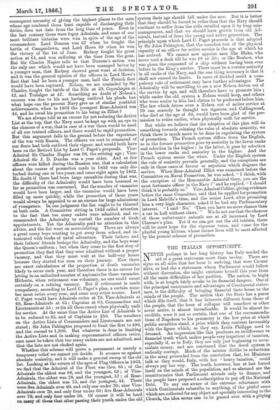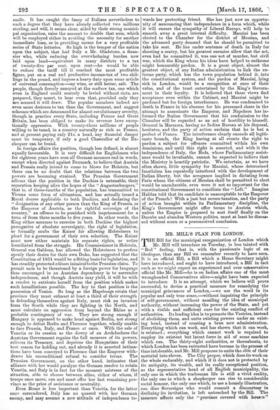THE ITALIAN OPPORTUNITY.
NEVER perhaps in her long history has Italy needed the aid of a great statesman more than to-day. There are signs on all sides that her hour is arriving, that were Cavour alive, or had she a statesman whom Parliament would follow without discussion, she might extricate herself this year from all the main difficulties of her position. The nation, to begin with, is at length fairly awake to its financial dangers. One of the principal annoyances and advantages of Continental states- men, is the difficulty of bringing financial facts home to the minds of the people. The notion that the State has a purse which fills itself, that it has interests different from those of the people, that the hour of collapse will somehow or other never arrive, is almost ineradicable. It would be almost in- credible, were it not so certain, that one of the recommenda- tions of Napoleon to his peasantry is the low price at whieh public securities stand, a price which they contrast favourably with the figure which, as they say, Louis Philippe used to demand. An impression like this produces an indifference to financial truth which.makes people very impatient of taxation, especially if, as in Italy, they are only just beginning to accu- mulate money, and are convinced. that the fiscal system is radically corrupt. Much of the intense dislike to reductions in the army proceeded. from the conviction that, let Ministers talk as they would, Italy, with her " heavy taxation," could always pay her way. The truth, however, has at last forced itself on the minds of the population, and so alarmed are the constituencies that Parliament attends only to finance, and the people have proposed. a subscription to pay off the National Debt. To any one aware of the extreme reluctance with whieh Continentals subscribe to anything, of the pitiful sums which are collected for any object not specially interesting to the Church, the idea seems one. to be passed over with a pitying smile. It has caught the fancy of Italians nevertheless to such a degree that they have already collected two millions sterling, and will, it seems clear, aided by their strong munici- pal organization, raise the amount to double that sum, which will be employed either in avoiding the necessity for another immediate loan, or in providing means for a very profitable series of State lotteries. So high is the temper of the nation upon the subject, that had Italy a Mr. Gladstone, a finan- cier who, while reducing the overwhelming burden now laid upon land—equivalent in many districts to a tax of twenty-five per cent. upon rent—he. would be able to reduce the tariff till it reached the most profitable figure, put on a real and productive income-tax of two shil- lings in the pound, and impose a heavy duty upon some article of universal consumption—say wine, or still better, salt. The people, though fiercely annoyed at the multure tax, one which even in England could scarcely be levied without riots, are prepared, they assert, to bear even that, provided .only they are assured it will draw. The popular members indeed are even more desirous to tax than the Government, and suggest schemes which are denounced for almost revolutionary severity, though in practice every State, including France and Great Britain, has been obliged to make its revenue laws excep- tionally oppressive. With twenty-three millions of people willing to be taxed, in a country naturally as rich as France, and at present paying only 21s. a head, any financial danger must be temporary, if only a good Chancellor of the Ex- chequer can be found.
In foreign affairs the position, though less defined, is almost equally favourable. It is very difficult for Englishmen who for eighteen years have seen all German menaces end in words, except when directed against Denmark, to believe that Austria and Prussia really intend to come to blows for Holstein, but there can be no doubt that the relations between the two powers are becoming strained. The Prussian Government affirms that the position in the Duchies is untenable, their separation keeping alive the hopes of the " Augustenburgers," that is, of three-fourths of the population, has transmitted to Vienna some form of ultimatum, and has actually issued a Royal decree applicable to both Duchies, and declaring the " designation of any other person than the King of Prussia, or the Emperor of Austria, as the rightful sovereign of the country," an offence to be punished with imprisonment for a term of from three months to five years. In other words, the King either assumes to exercise in both Duchies the highest prerogative of absolute sovereignty, the right of legislation, or formally snubs the Kaiser for allowing Holsteiners to plead for a government of their own selection. The Kaiser must now either maintain his separate rights, or retire humiliated from the struggle. His Commissioner in Holstein, General von Gablenz, has allowed the Holsteiners to profess openly their desire for their own Duke, has suggested that the Constitution of 1831 would be a fitting basis for legislation, and has steadily protected editors inimicaltothe Prussian claim. To permit men to be threatened by a foreign power for language thus encouraged in an Austrian dependency is to surrender independence, and though Austria may yield, it will be with a resolve to extricate herself from the position which makes such humiliations possible. The key to that position is the possession of Venice. So long as the Hapsburgs retain that province they must exhaust at least a third of their strength in defending themselves against Italy, must risk an invasion from the South while they are fighting in the North, and must calculate on aggression from beyond the Rhine as a probable contingency of war. They are strong enough if Hungary is appeased to make head against Berlin, not strong enough to defeat Berlin and Florence together, wholly unable to face Prussia, Italy,. and France at once. With the sale of Venetia or its cession as the dowry of an Archduchess the Austrian Government regains the full measure of its powers, relieves its Treasury, and deprives the Hungarians of their best reason for holding out, and already it is asserted intima- tions have been conveyed to Florence that the Emperor with- draws his unconditional refusal to consider terms. The Prussian Government, on the other hand, intimates that alliance with her would paralyze the German resolve to retain Venetia, and Italy is in fact for the moment mistress of the situation, able to choose between allies, either of whom, if troops once move, can and must offer her last remaining pro- vince as the price of assistance or neutrality.
Even Rome is less important than Venetia, for the latter once surrendered, Italy has no quarrel with her German enemy, and may assume a new attitude of independence to- wards her protecting friend. She has just now an opportu- nity of announcing that independence in a form which, while it will ensure the sympathy of Liberal Europe, will help to smooth away a great internal difficulty. Mazzini has been elected to the Chamber for the district of Messina, and the advanced party demand that he should be permitted to take his seat. He lies under sentence of death in Italy for shooting a sentry, but his greatest enemies allow that the act, even had he committed it, was one not of murder, but civil war, which the King whom his ideas have helped to enthrone might honourably pardon. It is a great object, almost the greatest object, of any Italian administration to link the ex- treme party, which has the town population behind it, into the constitutional system, and the pardon of Mazzini, lying sick in London, would be a recognition at once of their value, and of the trust entertained by the King's Govern- ment in their loyalty. It is believed that these views find acceptance even within the Cabinet, and Mazzini might be pardoned but for foreign interference. He was condemned to death in France in his absence for his presumed share in the attempt to assassinate the Emperor, and Napoleon has in- formed the Italian Government that his readmission to the Chamber will be regarded as an act of hostility to himself. General la Marmora, having no Indian Bureau at his disposal, hesitates, and the party of action exclaim that he is but a prefect of France. The interference clearly exceeds all legiti- mate bounds, the King having at all events the right to pardon a subject for offences committed within his own dominions, and until this right is asserted, and with it the independence of Italy, the Reds, whose Parliamentary assist- ance would be invaluable, cannot be expected to believe that the Ministry is heartily patriotic. We entertain, as we have often shown, little sympathy for Mazzini, whose determined fanaticism has repeatedly interfered with the development of Italian liberty, but the arrogance implied in dictating from Paris whom the citizens of Messina shall be permitted to elect would be unendurable, even were it not so important for the constitutional Government to conciliate the " Left." Imagine Halifax told that its candidate is unacceptable to the Emperor of the French! With a just but severe taxation, and the party of action brought within its Parliamentary discipline, the King's Government might offer terms to Austria which, unless the Empire is prepared to seat itself finally on the Danube and abandon Western politics, must at least be dines- sed without scorn or a preconceived conclusion.































 Previous page
Previous page